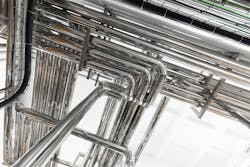Application Corner: Flowmeter accuracy in the plant
Much of my work in legal cases involves flowmeters that obviously do not measure accurately, flowmeters that are suspected of not measuring accurately and instrumentation equipment that failed. While it is not appropriate to divulge specific details about specific legal cases, there are some generalities that can be discussed that can have direct analogies in your plant.
It is likely that you have flowmeters in your plant that you feel do not measure accurately. You may not know why, but you can just feel it. That’s nice, but it is much more compelling to back this up with analysis based on information using other plant measurements. Performing a heat and material balance around the flowmeter can go a long way to confirming your feeling or not.
The economic benefit of fixing an inaccurate flowmeter can be significant in some applications such as when feeding nonrecoverable raw materials into a process. In other applications, significant operational benefits can accrue when a precise amount of material must be metered to maintain product quality.
While necessary to operate the process, the majority of flowmeters in plants do not generate significant economic or operational benefits. Flowmeters that do generate benefits are typically selected, engineered, installed, operated and maintained well. Such was the installation of a flowmeter at a reactor discharge that was used to determine its yield. The flowmeter did not add to the bottom line, but it let you know when there was a problem so you could act quickly to reduce the economic and production losses associated with the problem.
David W. Spitzer is a principal at Spitzer and Boyes, LLC, which offers engineering, focused market research, writing/editing white papers, strategic marketing consulting, distribution consulting, seminars and expert witness services for manufacturing and automation companies. Spitzer has written more than 400 technical articles and 10 books about flow measurement, instrumentation and process control. He can be reached at 845-623-1830 or via spitzerandboyes.com.
About the Author
David W. Spitzer
David W Spitzer’s new book Global Climate Change: A Clear Explanation and Pathway to Mitigation (Amazon.com) adds to his over 500 technical articles and 10 books on flow measurement, instrumentation, process control and variable speed drives. David offers consulting services and keynote speeches, writes/edits white papers, presents seminars, and provides expert witness services at Spitzer and Boyes LLC (spitzerandboyes.com or +1.845.623.1830).
